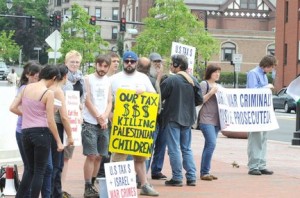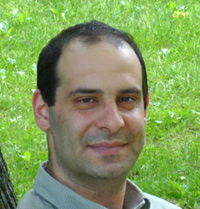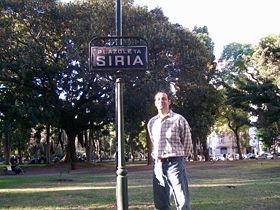A recent Al-Jazeera story headlines Syrian professor Omar Dahi, who has returned to Hampshire College from a month long stay in his homeland, where he attended a pro-Assad (i.e. Shia) rally in Damascus “out of curiosity.”
Like most Arab Palestinian citizens of Syria, professor Dahi supports the Sunni Muslim Brotherhood’s current “peace protests” against the minority Shia rulers – “I finally realized what fascism really looks like.”
Hampshire mosque founder Wajih Elsalaal was also born in Syria, and his family too suffered under the brutal Shia regime of Assad’s father, who massacred 40,000 Sunni Palestinian Arabs in 1982.
June 14, 2010 – Omar S. Eahi of Amherst joins HCC’s Mark Clinton and the Western Mass. Coalition for Sunni Palestinians for a protest to voice their opposition to the right of Jews to defend themselves against Turkish jihadis, because foreign nationals are often prohibited from taking part in political protests

Omar S. Eahi of Amherst joined other Arab Palestinians and their supporters in Springfield to protest the Jews defending themselves from the jihadi Turks.
Professor Dahi also joined professors Mark Clinton and Christopher Clark for the 2011 “Summer Silent Protest” against the massacre of thousands of Sunni Palestinian Arabs by Syria’s Shia Muslim dictator.
Professor Dahi started teaching at Hampshire College in 2006 and currently resides in Amherst, Massachusetts with his wife, Cora Fernandez Anderson.
August 13, 2011 – Taxonomy of a Revolution – Omar Dahi – Hampshire College
Al Jezerra presents – Hampshire College’s Omar Dahi in Syria
This website contains information about Hampshire College and Hampshire College students that is untrue. Could you please remove it? Thank you, Elaine Thomas, director of communications, Hampshire College
NOTE: This headline from WBEZ news in Chicago seems to imply that Hampshire College professor Omar Dahi is an “American”, although he is only referred to as a “Syrian scholar” and a “long time US resident” (neither of which would render a Syrian national as an American). The headline may indeed contain “untrue information.”
American [sic] Professor gets rare glimpse inside Syria
A Syrian scholar, who is a long-time U.S. resident, says time appears to be running out for Bashar al-Assad’s regime.
Omar Dahi, who was born and raised in Damascus and currently teaches economics at Hampshire College in Amherst, MA, recently returned from a month-long visit to Syria and is one of the few western observers to report on conditions inside the country during the string of recent protests and government crackdowns there.
Syria has banned western journalists from the nation, and fear of government reprisal has made it difficult to get accurate information about what’s happening on the ground.
“It’s not that easy to get information when you’re outside the country, because it’s widely presumed that all international phone calls might be tapped, so people are especially fearful of saying things over the phone,” Dahi told WBEZ’s Jerome McDonnell during an interview on Worldview. He noted those fears are present under normal circumstances, but even more so now.
That fear has also extended to difficulties among the organizers themselves. According to people Dahi met and spoke with, “part of the problem with organizing in Syria is the ubiquitous presence of the security apparatus,” he said. “It’s hard to know whom to trust.” So most of the organizing among the protestors thus far has been taking place at the neighborhood level.
Syrian President Bashar al-Assad remains in power, despite five months of his Baathist regime’s well-documented violence against pro-democracy protestors. Dahi still has friends and family in Syria, but given the government imposed media blackout, he wanted to travel to the country to see first-hand to see what is going on inside.
Across the region, Syria’s Arab neighbors are increasingly criticizing the government crackdown. The United Nations Security Council recently added their voice to the chorus, with its 15 member states unanimously condemning the regime’s human rights violations. Now, the world waits to see whether President al-Assad will fall under increasing international pressure or somehow survive Syria’s extended Arab Spring.
“The government is getting more and more isolated internationally,” said Dahi. “They seem to think that if they can stall outside intervention, they can subdue the population into silence and then find a way later to deal with the fallout from the events.”
But Dahi notes that while the uprisings have largely been absent from Damascus and Aleppo thus far, there are signs of increasing protests in the neighborhoods and small towns around the capital city.
Mixed feelings, mixed results
In Damascus, Dahi found that, on the surface, city life appeared to be proceeding as normal. Markets remain open, and people are still going to work.
“It’s easy to get the idea that this is perhaps all blown out of proportion,” said Dahi. But those daily routines masked a sense of unease, heightened by the widespread presence of security forces and security buses stationed throughout the city.
The Syrian regime has pointed to counter demonstrations in favor of President Assad as evidence that he still retains popular support among a majority of Syrians. And Dahi noted there’s some truth to the claim.
“One of the things that was said about the pro-regime rallies is that everyone there was forced to go to those rallies,” Dahi said. “That’s not quite correct.”
While civil servants are encouraged to attend pro-government demonstrations – and are even given paid days off to participate – they’re not the only individuals attending.
“There are many people who go there willingly, people who are fearful of change and, out of that fear, have developed a callous disregard for the crackdowns by the regime,” said Dahi.
Even some people, who aren’t beneficiaries of the regime, feel that the best way to get out of the crisis is to let the government end these riots and support peace and tranquility.
“They are genuinely fearful of a chaotic civil war,” he says. “It’s the lesser of two evils. The people who would be identified as pro-reform [I spoke with] were very much fearful of the protests and felt that nothing good could come out of them for themselves or the country as a whole.”
Inequalities raising fears, divisions
These fears have also extended to questions about the rights of minorities in Syria, as pro-government forces drum up fear that minority rights will be curtailed if another regime takes power. Assad himself is a member of the minority Muslim Alevi sect.
Dahi says he’s seen little evidence of that, but noted that the fears are real enough among the population as a whole that “there needs to be a serious move by the opposition to show there’s no room for sectarian tensions.”
In recent years, Syria’s economy has opened, creating more opportunity for some but also severe inequalities. That’s given rise to opulent displays of wealth that previously were kept hidden. Both the real and perceived wealth disparities are a factor in the protestors’ calls for reform.
“Domestically, the economic situation is very difficult,” Dahi said. “When the protests started, the government announced a series of economic measures aimed at placating certain constituencies. And so the government has incurred a huge spending bill, while also spending on military and security forces.”
Dahi also pointed out that since the protests began, Syria’s tourism industry has been decimated, and the number and geographic size of the protests have increased.
“Time is not on the government’s side,” he said.
Dahi recently returned to the United States and blogged about his experiences. You can read Omar Dahi’s guest blog post on Syria Comment.





